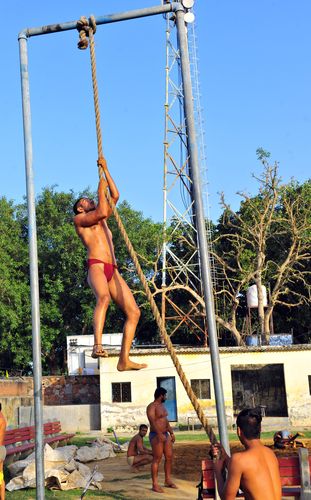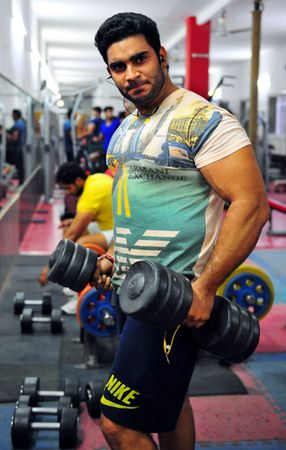Outside Delhi, past the fortified farmhouses of Chhatarpur is a dusty lane leading to the centuries-old, twin villages of Fatehpur Beri and Asola. The Tanwar warriors who, by some accounts, fought under Prithviraj Chauhan came from here. Home to the pastoral Gujjars, Asola provides the lion’s share of bouncers to Delhi and satellite towns—50,000 residents; 500 bouncers.
 Roping up at the Guru Lekhraj Akhara.
Roping up at the Guru Lekhraj Akhara.
A traditional mud akhara (wrestling arena) stands at the start of the village. Loincloth-clad wrestlers, ranging from teenaged novices to professionals in their prime, are sweating it out here.
“It is in our genes to have strong bodies and to use the strength to maintain peace and protect women,” said Vijay Pehalwan of the Guru Lekhraj Akhara. “We are traditionally cattle breeders, but we have a history of being warriors. Apparently, our ancestors yoked Englishmen to the plough for insulting our women. Times have changed. Akharas have given way to gyms, and mudgars to dumbbells. We now guard pubs, instead of forts. But, one thing unchanged is the inner strength we pass from one generation to the other.”
Satbir Sharma, a bouncer, added that while novices may have switched to modern diets or techniques of training, they continue to shun alcohol and smoking. “And, no fooling around with girls.” All these restrictions are “to strengthen the boys from the inside,” said Sharma.
The boys are a happy lot to have broken free from their destiny as cattlemen. The first wave of bouncers rode the real estate boom that swept the national capital region in the late 1990s. The boom brought with it malls and pubs. The current crop from Asola have a wider horizon.
“We are no more the crude bouncers which our seniors used to be in 1990s and early 2000s,” said Sonu, a bouncer. “I was part of Salman Khan-starrers Bajrangi Bhaijaan (2015) and Sultan (2016). If they need muscular men in the movies, they come to us without a second thought. Salman was impressed by my body and suggested a better protein [supplement].”
 Money ball: Average earnings in the trade range from Rs 30,000 to Rs 50,000 a month.
Money ball: Average earnings in the trade range from Rs 30,000 to Rs 50,000 a month.
But, bouncers have a sell-by date. So, retired bouncers move up the chain and become trainers or start gyms, security agencies and even pubs. “Most of us have set up gyms where we train the future generation and help them make a name as bouncers, or in the movie industry or in sports. The gyms here have evolved over the years, from single-room affairs with two or three machines to plush ones,” said Raj Tanwar, owner of The Gym.
You can tell where the bouncers work, judging by the time they come in for their workouts. Those with day jobs come in early; the nightclub crowd comes in at around midday. Each of them spends around Rs 300 a day on food. The average daily intake is something like this—a boiled chicken, 10 egg whites, a dozen bananas and 10 litres of milk, which comes free from their own cows and buffalos. Additionally, Rs 8,000 to Rs 10,000 is spent every month on protein supplements, by those wanting to make it to show biz.
Average earnings range from Rs 30,000 to Rs 50,000 a month. Earnings go up considerably during elections, celebrations or when they guard celebrities and politicians. For guard duty, daily wages range from Rs 2,000 to Rs 4,000.
“This profession sustains us best, as we do not have much educational facilities or motivation,” said Parveen, as he pumped iron. “It gives us easy money, which is way more than what you get from lowly government jobs. Our sweat has transformed the village and our lives.” The bouncers’ success is quite evident in the swanky gyms, trainers and dieticians, and SUVs parked next to tractors.
As we drive out of Asola, we pull up to talk to a few veiled women walking by. The woman who talked refused to give her name, as “it is against village norms”. She said, “Our men go to pubs, but it is forbidden for us to even think about it. And, there are other forbidden things like love marriages or even carrying a smartphone after coming back from college. I once went to Sahara Mall in Gurgaon, and peeped inside where my husband worked. It is a different world, where I do not want to wander.”






